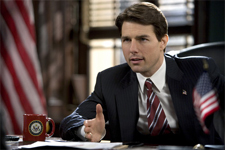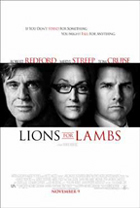Lions for Lambs
|  You shouldn't blame yourself if you mistakenly think that Lions for Lambs, Robert Redford's didactic excursion into contemporary politics and U.S. foreign policy, is based on a stageplay. While screenwriter Matthew Michael Carnahan had previously served up the war on terror using straight blood'n'guts with a side order of “everyone is the same” platitudes in The Kingdom, here his weapons of choice are words, words, and more words. It's not like dialogue can't be interesting, even enthralling, but the way Redford stages the discursive combat is so stilted and dull that it drains most of the film's life and makes it feel like a series of lectures, rather than dramatic encounters. You shouldn't blame yourself if you mistakenly think that Lions for Lambs, Robert Redford's didactic excursion into contemporary politics and U.S. foreign policy, is based on a stageplay. While screenwriter Matthew Michael Carnahan had previously served up the war on terror using straight blood'n'guts with a side order of “everyone is the same” platitudes in The Kingdom, here his weapons of choice are words, words, and more words. It's not like dialogue can't be interesting, even enthralling, but the way Redford stages the discursive combat is so stilted and dull that it drains most of the film's life and makes it feel like a series of lectures, rather than dramatic encounters.The film weaves together three interrelated plots all happening at the same time over several hours. In Washington, D.C., hotshot young Republican senator Jasper Irving (Tom Cruise) has granted an hour-long interview with television journalist Janine Roth (Meryl Streep) to unveil his new military strategy in Afghanistan. Said plan involves establishing strategic military points high in the Afghan mountains, and while it looks good on paper, it fails miserably as a U.S. chopper is hit by small-arms fire, stranding two wounded soldiers (Michael Peña and Derek Luke) in frigid enemy terrain. Meanwhile, well-meaning political science professor Stephen Malley (Robert Redford) has an early morning meeting with a slacker student (Todd Hayes) who once showed potential for political activism, but is now retreating into his Generation Y cocoon of irony and disenchantment. Each subplot is meant to put a face on that great abstract of our times: “the war on terror.” The Washington, D.C., meeting pits determined political chutzpah against skeptical journalistic integrity, while also functioning as a clear-cut ideological battle of Right vs. Left: Cruise's senator barks words like “evil” and “victory” with simpleminded efficiency while Streep's journalist compares everything to Vietnam. The stranded soldiers in the Afghan mountains humanize the military, showing that they are but pawns (however self-aware they may be) in a struggle for global political control, and the professor/student showdown is a battle of political commitment versus retreat. Amazingly, despite all the talk, there is very little actual clarity in the film outside of its criticism of comfortable men in air-conditioned rooms making momentous decisions that involve real human lives as if they were playing chess (the title comes from a statement made by a German officer in World War I as he admired the British infantryman and despised their commanding officers: “Never have I seen such lions led by such lambs”). There are other issues swirling around, as well, especially the question: Does it mean anything anymore to be engaged, or is it all a losing proposition because those who are in power will do what they want anyway? The answer in Lions for Lambs is a resounding “yes” to the former, even as it traffics in artificial tragedy to drive home the point that we're as lost as we've ever been. The problem with Lions for Lambs isn't its unabashed politics or its naked sincerity, but rather the fact that Redford fails to give his ideology a dramatic shape. The interwoven narrative strategy that gradually reveals hidden connections is so old hat at this point that it feels more hackneyed than revelatory, even in such highly concentrated form. We can be thankful that Redford was at least efficient in moving through the film's argument and that he was able to coax some genuinely good performances out of his actors, especially Tom Cruise, whose mixture of pit bull determination and snake-oil salesmanship is both repugnant and oddly convincing--a strange hybrid of Top Gun's Maverick and Magnolia's Frank T.J. Mackey. Redford, on the other hand, is entirely unconvincing as the high-minded professor; he never sounds like a man of genuine conviction, but rather like a loudspeaker for tired clichés about the importance of political engagement in a democratic society. That doesn't make him wrong. But, like Lions for Lambs as a whole, it does make him rather boring. Copyright ©2007 James Kendrick Thoughts? E-mail James Kendrick All images copyright ©2007 United Artists |
Overall Rating: 
 (2)
(2)


